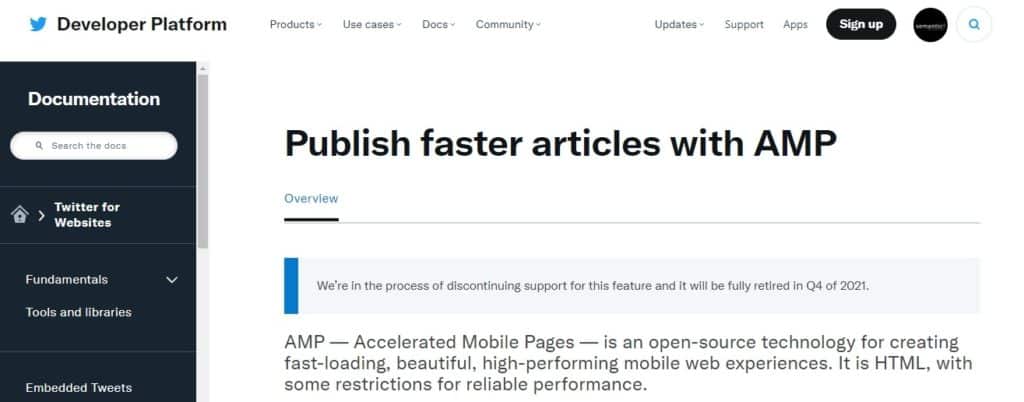
Is AMP still relevant in 2022?
Accelerated Mobile Pages, otherwise known as AMP, has been the source of much speculation and debate since its inception. Although it claims a faster user experience and better search engine rankings, it comes with radical mobile optimisation. And, even with a large number of users from the start, many development teams remain sceptical as to whether or not it can live up to its promise.
Although AMP has never been deemed a direct ranking factor by Google, the search engine has still in many cases been known to provide a distinct advantage over non-AMP sites. However, with our only constant being change – we contemplate the future of AMP.
Let’s take a look at why AMP was important in the past, its function within the ever-shifting world of SEO, and lastly, whether or not it is here to stay.
What is AMP?
AMP, originally created by Google as a competitor to Apple News and Facebook Instant Articles, is an open-source HTML framework developed by the AMP Open Source Project. AMP is optimised for mobile web browsing and intended to help web pages load faster on all mobile devices.
How does AMP work?
When AMP is applied, your mobile pages load instantly. A great deal of that speed comes from implementing web design best practices, but an imperative advantage is gained by smart rendering tricks that start loading your page before it’s even visited.
The two factors of AMP:
- Web Design Restrictions: AMP enforces strict web design restrictions that allow only inline styles, limit CSS to 50KB, limit JavaScript to 150KB, and completely remove all the riff-raff from the critical rendering path. As they stand, these restrictions are enough to create very fast web pages – but it’s not the secret ingredient that makes them instant.
- Pre-rendering: Whenever mobile search results include AMP pages, Google starts loading resources for these pages even before they are visited. By the time the user looks through search results and choose a page to visit, it will already be loaded and shows instantly. If the page is non-AMP, it will start to load only when you visit it.

Does Google AMP affect SEO ranking?
While AMP in itself is not a ranking factor, it comes with dramatic improvements in page speed and user experience, which is currently important for ranking in the SERPs.
Initially, AMP pages were displayed on the Top Stories section in Google search. However, for some time now, this hasn’t been the case. As part of a recent Core Web Vitals update, Google confirmed that AMP would no longer be a requirement for web pages to appear on the Top Stories section in Google search.
Top positions on Google Search can now feature both AMP and non-AMP web pages, as long as the Page Experience criteria of Core Web Vitals is followed. With this major advantage of AMP now being lost, many web developers now believe the pros of AMP technology exceed the cons.
An important point to remember is that the rules are different for those who run news sites specifically. Google has numerous dedicated story panels that completely dominate search queries surrounding anything news related. As you can see on the screen below, you won’t stand a chance of getting into those story panels without an AMP page.

AMP Pros and Cons
The Benefits of AMP
- Increased web page speed: Page speed increases web page visitors engagement with content and with this, visitors are more likely to make purchases on pages that are quick and hassle-free. Faster load times also mean that visitors are less likely to lose patience – Resulting in them navigating away from your content or abandoning their carts. As mentioned above, page speed is also a huge ranking factor for Google.
- Helps improve the server performance of the website: The usage of AMP helps a website to generate traffic from mobile that reduces the load on servers and helps improve a website’s overall performance.
The Cons of AMP
- Increase the performance of the website through Cache: As we know, AMP is very useful in increasing the loading speed of the website. However, it largely depends on the cache, which in turn is an unfavourable side of using AMP.
- AMP negatively affects the Analytics of a website: Although AMP supports Google analytics, it requires different tags that need to be implemented on all AMP pages – which in turn limits the usage of analytics for a website.
- Advertisement revenue of the website is reduced: Using Accelerated Mobile Pages limits the potential of the website to generate its revenue through ads. This is one of the biggest cons of using AMP as an application to produce a mobile-friendly website.
AMP Links Support Removed by Twitter
Twitter has removed support for AMP links, and will now direct users straight to the publisher’s page on their website – rather than the AMP pages that may be available.
The support page originally indicated how Twitter would automatically send the users of its mobile apps to the AMP version of a page via links posted on the platform. However, since October 21st, Twitter updated the page with a notice saying it’s retiring the feature by the end of 2021.

Should you implement AMP in 2022?
Simply put – implementing AMP in 2022 now only depends on whether or not you have a news site. If you do, you should have started using AMP 4 years ago. If you’re not a news site and your goal is not to feature in those headline story panels, then we don’t see why you should be converting to AMP in the future.
Similar web page speeds can be achieved with regular mobile optimization – therefore, if your website is already fast, don’t waste your time implementing AMP as it will have no added benefit.
Our Final Conclusion
Having listed of pros and cons above, it is largely recommended to not use AMP if you already have a fast and mobile-friendly website that is not news related. The AMP project offers an impressive speed advantage without sacrificing usability. However, it’s also on the verge of broadening these benefits to fast non-AMP pages. Therefore, AMP is about to become just another option for mobile optimization.
Need assistance with a super fast and mobile-friendly website? Our highly skilled team at Semantica Digital is just a phone call or email away.



